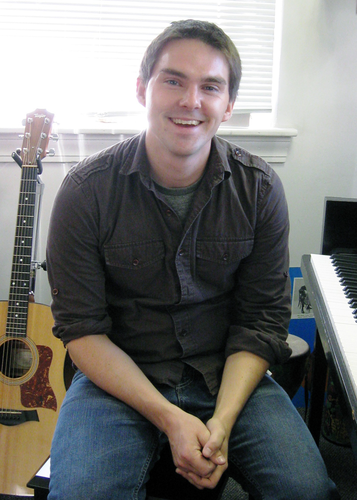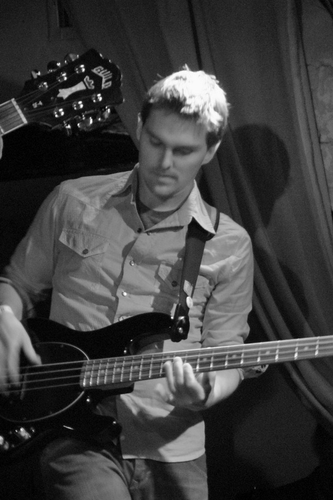Alumni Profile: Adam Sankowski '02
One year into a traditional liberal arts education, Adam Sankowski '02 found himself unmotivated and unsatisfied. He kept thinking about how much he'd loved playing in bands with his friends. He was thrilled to discover that he could study rock music and even play in an ensemble devoted to the work of Jimi Hendrix at Berklee.
But instead of pursuing a path as the guy up front on the stage, the guitarist and drummer found himself drawn in by a field he'd barely known existed: music therapy. The major demands dedication: Students undertake five semester-long practicums plus a 1,040-hour internship.
Sankowski is now a music therapist at the Kennedy Day School, which is on-site at the Franciscan Hospital for Children in Boston, where he works with adolescents who have a wide array of challenges and disabilities. He also supervises Berklee music therapy students who, like him, want to use music as a tool to help people grow. The following is a condensed and edited account of our conversation.
What was your experience with music growing up?
I played trumpet in the band, and then I discovered guitar in the eighth grade and practiced a whole lot. I played in your typical really bad high school bands. I kind of felt like if you were going to go to music school you had to be this classical virtuoso. There was all this music I loved playing in the garage with my friends, but I just didn't think going to Berklee was an option.
What are your students at the day school like?
It's a pretty broad spectrum of students who fall into the category of "special needs," individuals with both cognitive and physical challenges. Students are working on a lot of different skills: basic communication, learning how to express needs, working on being more social, how to engage with peers. Basic math, basic reading. It's person-centered, very specifically tailored.
What do they get out of playing music with you?
I think they get a very motivating environment to work on their educational goals. They get an age-appropriate place to socialize. For some of the very musically talented students, music is really the primary way that they can communicate and share what's going on with them. It's a way for them to connect to the world. On a self-confidence level, it really allows some of our students to shine.
What drew you to the field?
Music therapy kind of sounded exciting. In the intro class, it resonated with me that music was being used in this really interesting way. It was much more about the communal, social elements of music from the beginning. Plus, I thought, "Maybe I'll take a major where there are some very clearly defined job opportunities."
So did you get a job right away?
I was pretty lucky—I got a job at the place where I did my internship, in rural New York. Then when I moved to Boston I was able to get a job here. It takes a while sometimes just because the profession is so word-of-mouth. Now I'm constantly turning away jobs and sending them to other people. We have an intern at the hospital from Berklee—her last day was Friday and she just started her new full-time job this Monday.
What's it like for you to supervise Berklee students?
I feel like I have a little bit of compassion for what they're going through. I have a sense of the things I was confused about. Berklee is such an intense and competitive place sometimes. I think everyone questions: "What am I doing with my life—what is this weird profession?" I'm in a place to say, "You're really talented and I think you should stick with it."
Performance isn't an integral part of your job. Do music therapists have to be good musicians?
Every music therapy major has to take a drumming class, a voice class, two semesters of piano, two semesters of guitar. The stronger the musicality is, the more musical tools they have to draw from. Maybe the student suggests a specific song and you have the ability to learn the song on the spot. Some of our students might blurt out a melody or some lyrical ideas, and the more theory knowledge and technical skills that you have, the greater the chance that you can shape and use the student's idea on the spot. Berklee, for a large part, is about building skills for yourself. This is about building skills to use with other people.
Do you still cultivate your musical skills for yourself?
I'm in two bands—I play drums in one and bass in the other. I feel the two go hand-in-hand. The better a musician I become, the more tools I have to use in my sessions.


